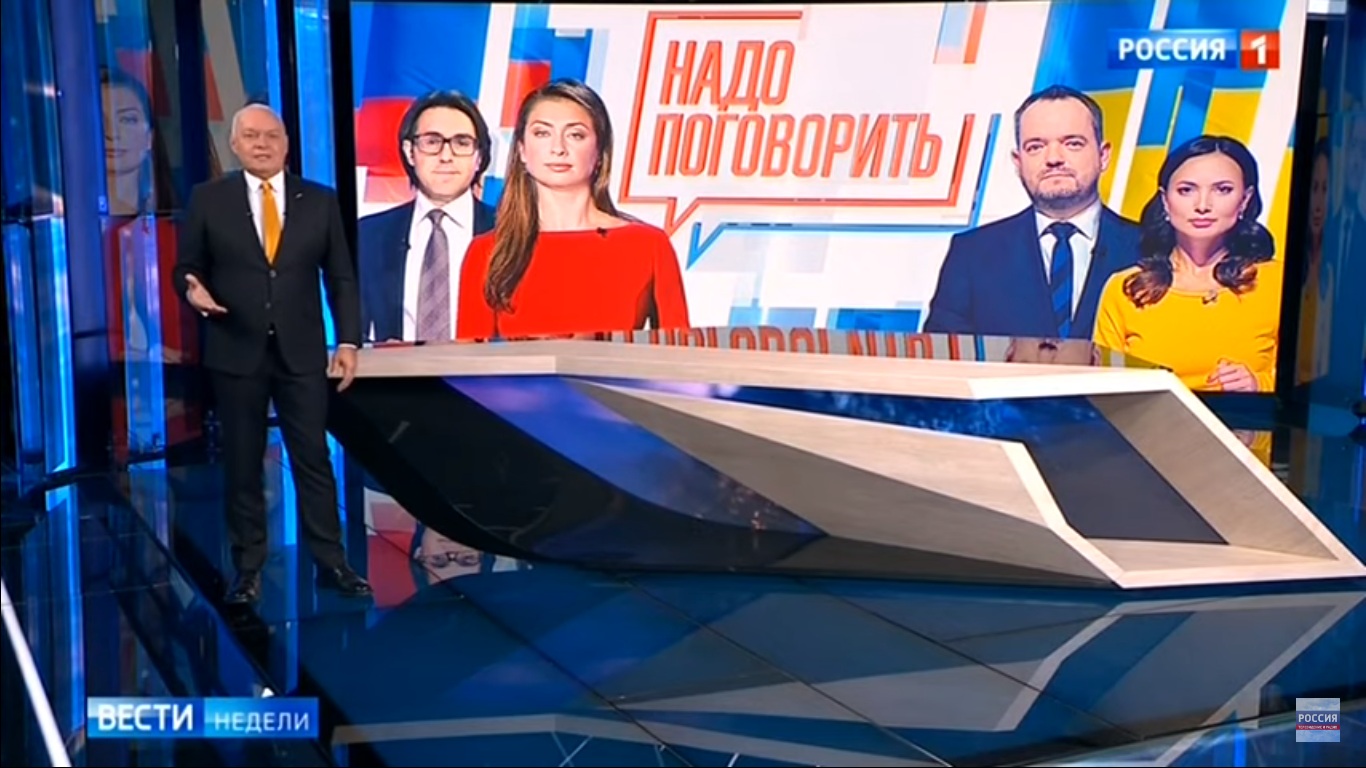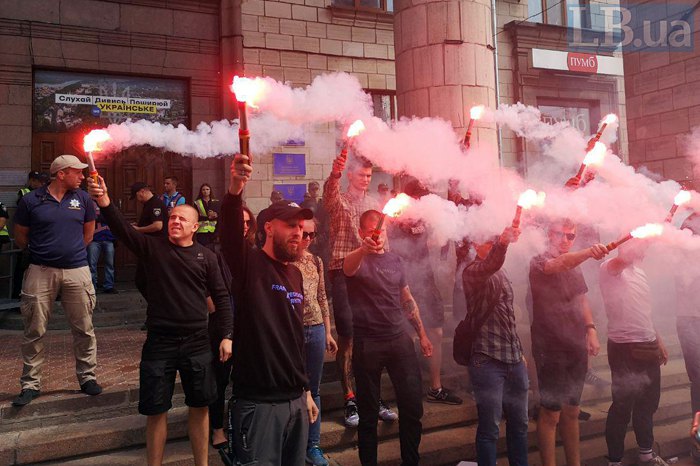At first, the Russian propagandistic state-owned TV channel Rossiya-1 announced a teleconference between the people of Ukraine and Russia. The show called “We Need to Talk” was to be aired jointly with the Ukrainian TV channel NewsOne.
The news quickly stirred up outraged discussions within Ukrainian society and protests near the NewsOne building were planned. On the next day, NewsOne canceled the show, citing physical abuse threats to the channel’s journalists and their relatives. It was crystal clear from the beginning that such a joint TV show with Rossiya-1 did not go in line with Ukrainian legislation. So the whole incident appears to be a pre-planned provocation made to fake pressure on the freedom of speech in Ukraine and to promote the political force standing behind with an image of a victim. However, it also stressed the fact that Ukraine's legislation has little opportunity to prevent such propaganda provocations, which makes future street protests against similar cases inevitable.
The closer the Ukrainian July parliamentary snap elections are, the more national media start playing brinkmanship. The penetration of Russian influence can be called a trend of the electoral campaign. In particular, it comes through the media affiliated to the party Opposition Platform for Life. The political force includes pro-Russian politicians who previously supported the corrupt regime of the runaway president, Viktor Yanukovych. One of the greatest influencers in Ukraine is Viktor Medvedchuk, who is perceived as the main voice of Vladimir Putin in Ukraine.
Recently, Taras Kozak, an MP from Medvedchuk’s close circle became a sole owner of ZIK TV channel. It is already third news channel owned by Kozak, which is, in fact, under control of Medvedchuk. The other two were 112 and the above mentioned NewsOne.

Read also: Putin crony Medvedchuk gains hold of Ukrainian TV channel ZIK, causing uproar in media community
The failed attempt to "talk"
On Sunday, 7 July, a video was published in which the Russian top propagandist Dmitriy Kiselev announced a TV conference between Ukraine and Russia called “We Need to Talk.” It was the same Dmitriy Kiselev whose fakes about Ukraine were so absurd, that he himself turned into a protagonist of multiple memes and jokes in Ukraine. Also, it was the same Rossiya-1 which together with other Russian nationwide channels spread propaganda and disinformation on the situation in Donbas, the MH17 crash, and many other topics.

“How was possible to organize a TV show with the aggressor country after five years of war with it?” people asked.
From the point of view of an ordinary Ukrainian, this might just look outrageous, though Ukraine’s legislation in this regard is unambiguous.
Rossiya-1 has been put on the list of the Russian channels banned in Ukraine back in 2014, from the beginning of the de-facto war. In that period, Ukrainian legislation on media was amended. It now foresees that international TV programs which come not from the EU or the countries which ratified the European Convention on Transfrontier Television can be re-broadcast in Ukraine only if their content corresponds to Ukrainian legislation and to the Convention.
“In my opinion, it was a well-rehearsed performance. Every outcome of it would be beneficial for the aggressor country and would lead to aggravation. Now the channel complains about the oppression of freedom of speech in Ukraine,” Oleksandr Burmahin told to Euromaidan Press.
Mr. Burmahin is a media lawyer and executive director of the Human Rights Platform NGO.
According to him, the Opposition Platform for Life can now use the incident for its PR campaign before the upcoming voting. And Russia would benefit from the announcement of the TV conference in either case, no matter whether the show would take place or not. Either it would accuse Ukraine of attacking the freedom of speech as it does now, or the actual show would finally take place. Another Russia's point is testing the reaction of the Ukrainian state institutions.
Even though the teleconference was canceled, a protest in front of the NewsOne’s building did take place. The protesters demanded the revocation of broadcast licenses of TV channels NewsOne and 112.
Mr. Burmahin points out that when the laws and the courts do not work in the country, street protests are unavoidable, as the TV show partnered with the aggressor country is too provocative for Ukrainian society.
"We experienced long-term inactivity of our government bodies and regulators in this field during the annexation of Crimea in 2014. Russia had seized most of the local population without a single shot using a variety of information tools long before the military invasion," the expert says.
Russia could obviously predict the protests when it prepared the teleconference.
Law enforcers suggest convening NSDC council

Despite NewsOne canceling the TV conference, Ukrainian law enforcement agencies released their statements regarding the incident.
In particular, Ivan Bakanov, the acting head of the Security Services (SBU) suggested initiating of an extraordinary meeting of the National Security and Defence Council (NSDC) to introduce sanctions against the NewsOne and 112 channels. He also appealed to the Parliament to assess the functioning of the said TV channels prior to the decision of the Anti-Monopoly Committee of Ukraine which considers the lawfulness of the acquisition of NewsOne, 112 Ukraine and ZIK TV channels by Taras Kozak.
The Prosecutor General’s Office (PGO) initiated proceedings over the channel's alleged attempted high treason under the televised conference the channel had announced.
Mr. Burmahin doubts that it would be possible to accuse someone of high treason just because of the announcement of the TV show. In return, the SBU statement, according to the lawyer, is balanced. However, the whole incident revealed the greatest problem in the Ukrainian media field.
While the particular NewsOne case shows the actions of law enforcement institutions which can be considered as relevant, previously there have been situations when the agencies interfered with the work of media groundlessly.
“Ukraine is now in the state of hybrid war in which media are used as weapons. However, on the legislative level, no civilized mechanism exists to counteract it,” explains Burmahin.
In his opinion, during five years of war, Ukraine issued only two good documents on information security. In 2016-2017, the NSDC approved a Strategy on Cyber Security and the Doctrine on Information Security. The next move would have been to establish working groups for developing particular mechanisms. However, there has been no progress on the issue by now. As well, there are no civilized rules of the regulation of the Internet in the country.
“To work on the corresponding legislation, we need to deal with subtle matters, to balance many details, like information, private life, cybersecurity etc. We need to have a microscope, but the government uses an ax,” says Oleksandr Burmahin. As an example, he mentions the bill #6688 which can give the SBU total control over the Internet.
Media experts explain the lack of progress in the area of media regulation in Ukraine by the unprofessionalism of the deputy corps since the members of the Parliament don’t share the understanding of the issue's complexity.
The role of the media regulator

On Tuesday, 9 July, activists organized a protest near the National Council on TV and Radio Broadcasting, the state regulator in the media field. The protesters demanded to annul the NewsOne’s broadcast license. On the same day, the Council convened its meeting to discuss the matter. However, does the regulator have the power to annul licenses?
Mr. Burmahin believes that, in fact, Ukraine’s legislation is very liberal, and its changes in reaction to the Russian aggression in Ukraine has been spotty at best. According to it, the National Council has no power to resolve such cases like NewsOne’s. First, it can act only after the content of the canceled TV conference would be analyzed. The regulator can strip of the license only in certain cases, for example, refusing to prolong the license when it has expired. However, it is not relevant to the NewsOne case.
Still, there are cases in which the National Council can go to court. With the NewsOne incident, the regulator can bring the legal action if earlier the channel was warned on its violations, but no reaction followed.
The incident with Rossiya-1 is by far not the first scandal involving NewsOne. In February 2019, the National Council fined the channel for hate speech, confirmed by the Independent Media Council. The hate speech accidents had happened months before, in Summer-Fall 2018. Later, the channel appealed to the court.
In December 2018, the National Council warned the NewsOne due to a violation of broadcasting rules on the Remembrance Day.
Earlier that year, the channel had the problems with the ownership structure when Andrii Portnov, the former head of Yanukovych’s Administration, took control of NewsOne in a dubious way - in rent, not adhering to legal procedures.
Serhiy Kostynskyi, a member of the National Council summarized the results of the regulator’s special meeting. The regulator would inspect whether NewsOne is sticking to legislation. The Council has also decided to appeal to the Parliament to expand the powers of the regulator.
The above-mentioned SBU statement also contains similar suggestion to empower the National Council “to make decisions on the revocation of the license for broadcasting or the revocation of the license of the provider of the program service without recourse to a court if the violations are not removed after the application of sanctions ‘announcement of warning’ and ‘imposition of fine’, or in the case of failure to comply with the order of the state regulator within the established by him deadlines.”
Real also:
- Putin crony Medvedchuk gains hold of Ukrainian TV channel ZIK, causing uproar in media community
- Two Ukrainian TV channels push Russian propaganda amid presidential election: report
- Opposition Platform & Bloc: Ukraine’s pro-Russian political forces and their chances
- What’s wrong with Ukraine banning two propaganda channels?
- The paid word: who owns Ukrainian media
- Ukraine makes progress in media freedom, but oligarchs still run the show
- Putin’s crony in Ukraine proposes new “compromise” plan ahead of Minsk talks

